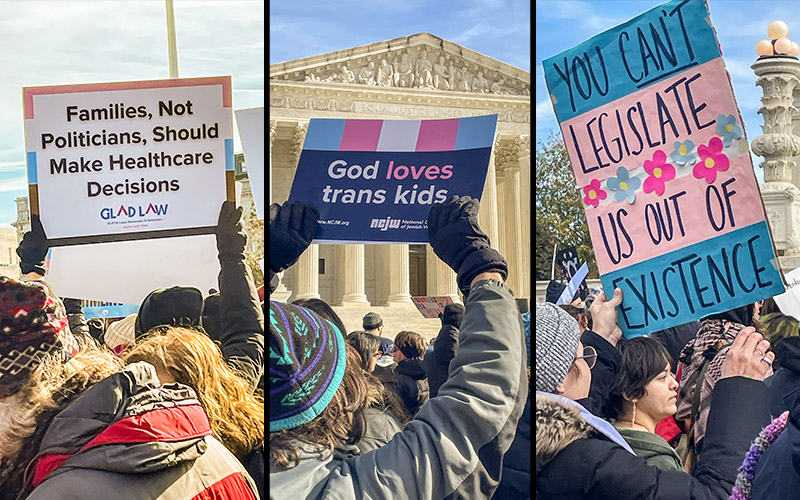House Passes Military Bill Banning Transgender Health Care
Congressional lawmakers passed a military funding bill banning TriCare from covering transgender health treatments for minors.

The U.S. House of Representatives passed an annual defense funding bill that contains a provision prohibiting coverage of gender-affirming medical care.
The House voted 281-140 to pass the bill, with 81 Democrats siding with Republicans. Sixteen Republicans voted against passage of the bill, primarily due to objections not having to do with the transgender care ban.
Under the provision, TriCare, the military’s health insurance plan, is banned from covering any medical treatment for “gender dysphoria that could result in sterilization” for minor dependents of military members.
The provision is vague in terms of what specific procedures will be prohibited, in part because puberty blockers are not proven to affect a person’s fertility.
Hormone therapy, which potentially can affect fertility, would clearly be banned, as would any surgical interventions on the genitals, which are rarely performed on minors.
Other surgical interventions, like mastectomies, technically do not affect fertility, although it’s clear that the intent of Congress is to block such surgeries from taking place on minors.
Coverage for gender-affirming treatments for adult dependents who still receive coverage through their parents’ insurance plan is not banned.
Ten states have adopted laws that ban Medicaid from covering the costs of gender-affirming treatments, even for low-income adults. It would not be surprising to see similar restrictions eventually placed on TriCare.
House Minority Leader Hakeem Jeffries (D-N.Y.) said Democrats didn’t “whip” the NDAA vote or advise their caucus members to adopt a specific position, instead allowing individual members to vote their conscience.
Jeffries claimed there were “a lot of positive things” within the NDAA that had bipartisan support but also acknowledged the bill contained some “troubling” positions.
House Speaker Mike Johnson (R-La.) hailed the bill’s various provisions, including a pay raise for junior service members and improved housing for military families. He also fully endorsed more controversial provisions, including the ban on gender-affirming care for minor dependents and a prohibition on the teaching of “critical race theory” at military academies.
The bill now heads to the U.S. Senate. If it passes, it will head to the desk of President Biden, who has the option of vetoing the bill or signing it into law.
If Biden signs the NDAA into law, it would mark the first federal statute placing restrictions on the LGBTQ community since the passage of the Clinton-era “Don’t Ask, Don’t Tell” policy, which prevented gay, lesbian, and bisexual military members from serving openly in the military.
Brendan Marty, a Navy veteran with a transgender daughter, told The Hill that federal lawmakers are refusing to listen to medical experts with expertise in treating gender dysphoria. Most major medical organizations in the United States have confirmed that gender-affirming treatments like puberty blockers or hormones are the recommended treatment for individuals suffering from gender dysphoria.
Another military member with a transgender daughter, going by his first initial “J,” told The Hill that they don’t understand how Republicans can believe the provision supports military readiness, as it takes away a benefit that families currently receive and creates additional concerns for the parents of trans youth, thereby providing another distraction that prevents those military members from being as effective as possible.
LGBTQ advocacy groups were outraged.
“When a service member is forced to choose between continuing their military service or protecting the wellbeing of their child, it also undermines military readiness and endangers national security,” Olivia Hunt, the director of federal policy for Advocates for Trans Equality, said in a statement. “Military families have enough to worry about — they should never have to fear that they can’t get necessary healthcare for their children.”
The National LGBTQ Task Force condemned the ban, accusing federal lawmakers of using transgender people as political pawns and urging Biden to veto the measure if it reaches his desk.
“Any provision that restricts bodily autonomy and access to healthcare is an attack on transgender individuals rather than addressing broader issues within the defense bill,” Allen Morris, the Task Force’s policy director, said in a statement.
Support Metro Weekly’s Journalism
These are challenging times for news organizations. And yet it’s crucial we stay active and provide vital resources and information to both our local readers and the world. So won’t you please take a moment and consider supporting Metro Weekly with a membership? For as little as $5 a month, you can help ensure Metro Weekly magazine and MetroWeekly.com remain free, viable resources as we provide the best, most diverse, culturally-resonant LGBTQ coverage in both the D.C. region and around the world. Memberships come with exclusive perks and discounts, your own personal digital delivery of each week’s magazine (and an archive), access to our Member's Lounge when it launches this fall, and exclusive members-only items like Metro Weekly Membership Mugs and Tote Bags! Check out all our membership levels here and please join us today!






















You must be logged in to post a comment.